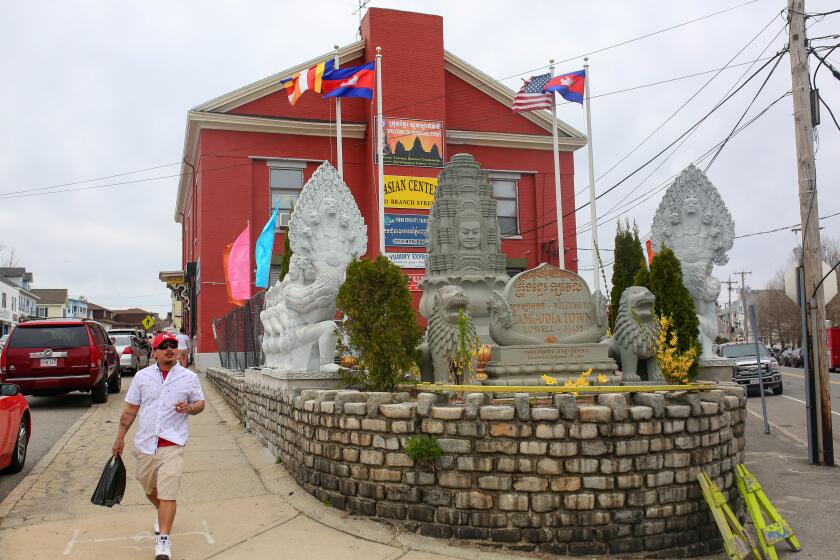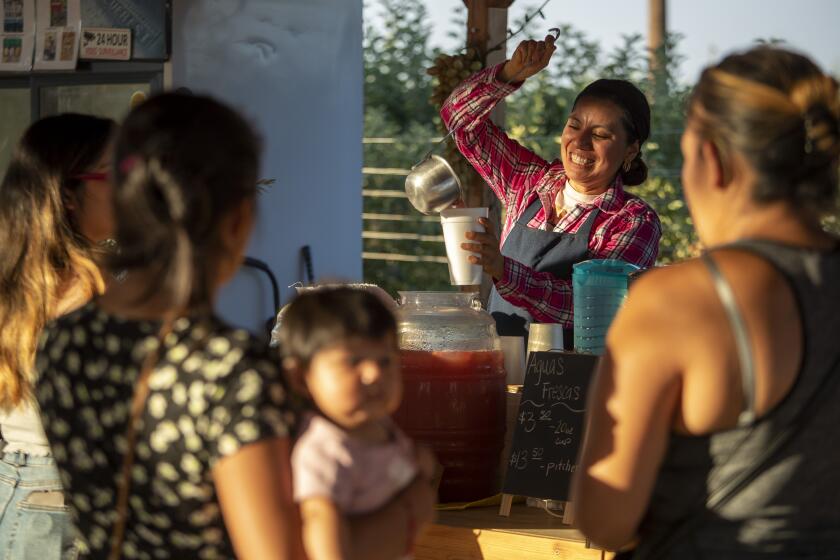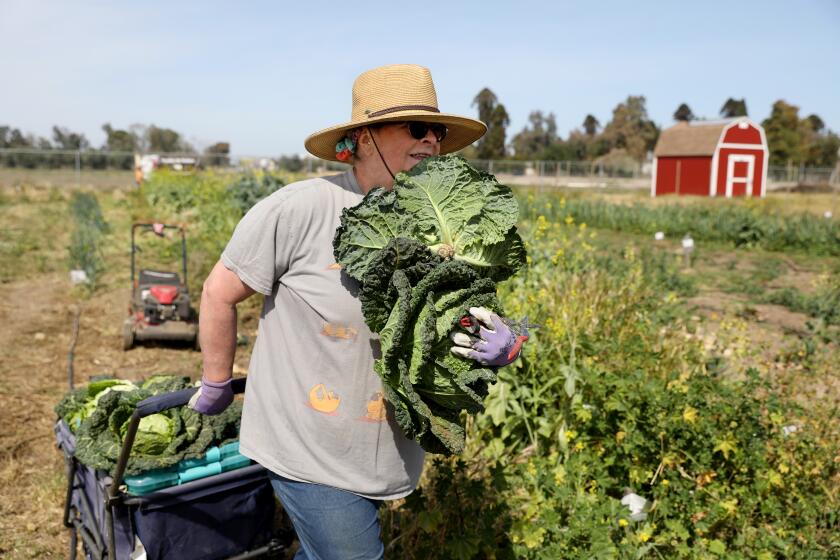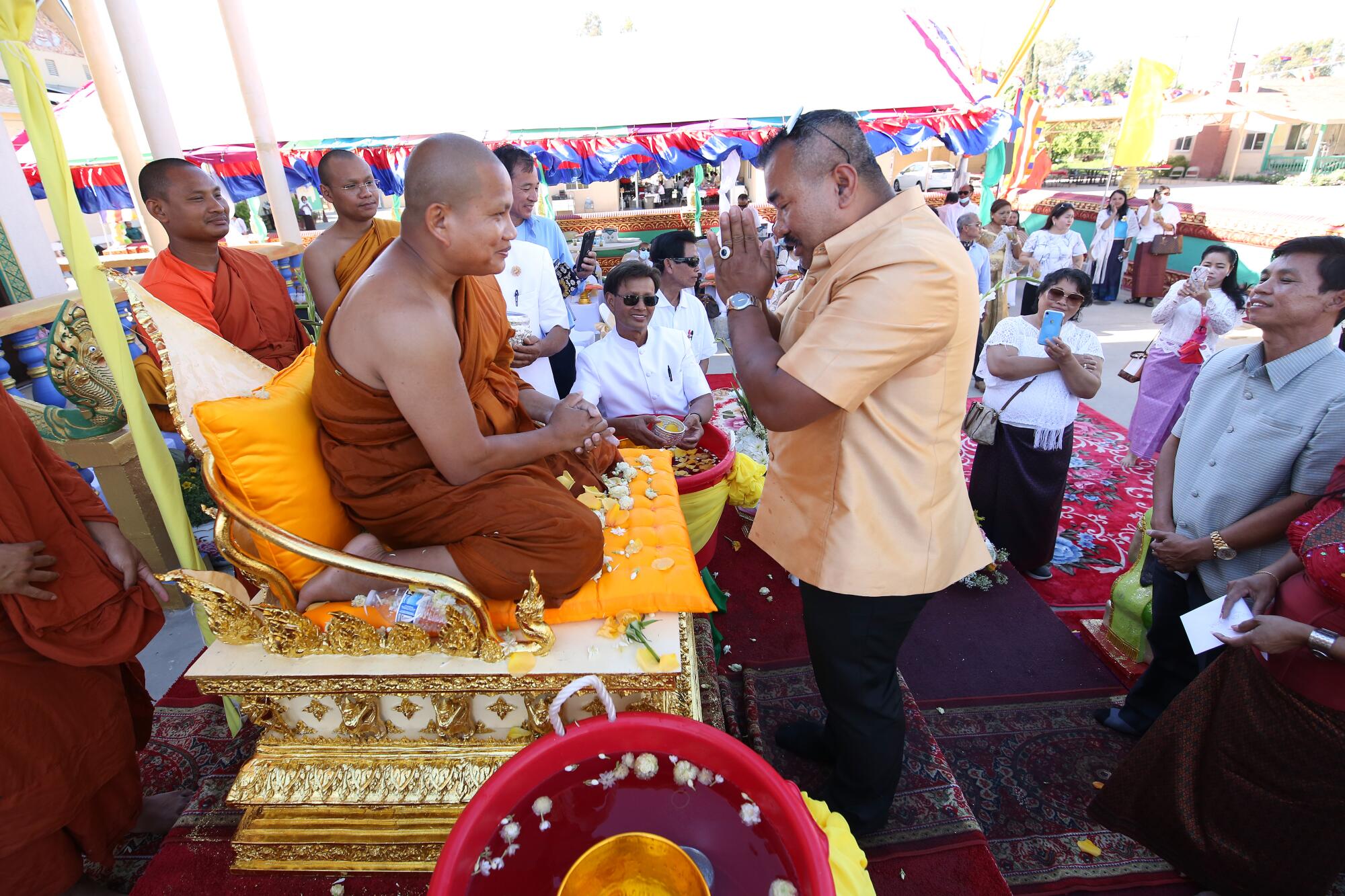
- Share via
FRESNO — Out west of the freeways, where city and rural meet, nothing seems out of the mix: a boy chasing a flock of chickens in his frontyard, tidy tract homes, aging trailer parks, the stretching fields, drivers in work trucks and luxury cars stopping at the agua fresca stand, its awning blocking the broiling sun.
But still the Cambodian temple surprises. It rises from the flat landscape — red, orange, gold, green — ringed by bare-breasted angels gleaming white in the sun.
Dragons arch over the entryway to the grounds where Danny Kim grapples with an oversize banner for Fresno Cambodian Nights.
Modeled after its lively counterparts in Cambodia, the night market launched in 2021, and immediately drew worldwide attention. A Cambodian man in Australia wrote a song about it. A Cambodian-French family came to see it firsthand. The Khmer community in Long Beach, the nation’s largest, looked into starting its own.
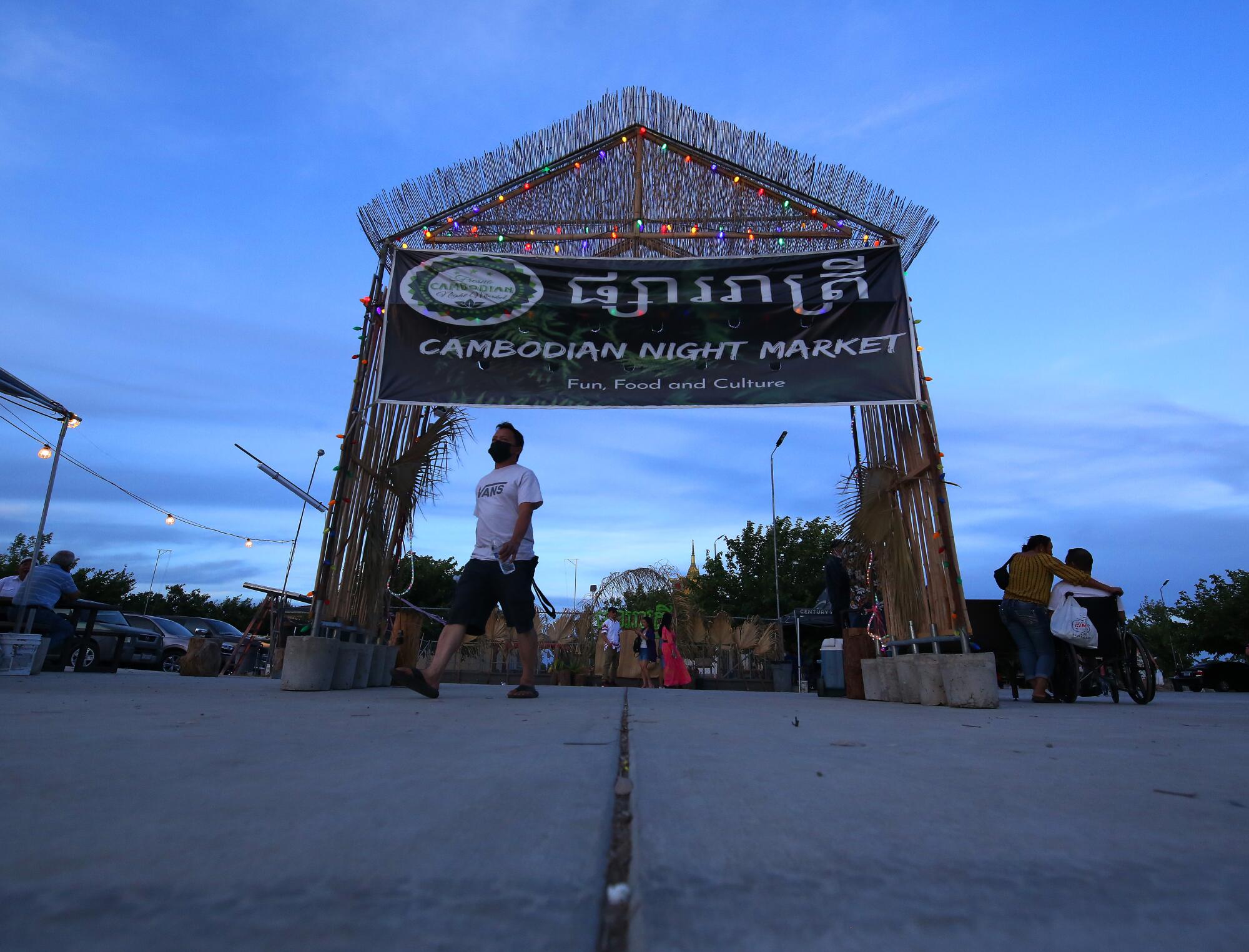
There hadn’t been anything like it before in the United States. The night market is a way to connect with the past and share Cambodian culture into the future.
“We’re the first generation who could think about more than surviving,” said Kim, a Fresno police sergeant whose family came to the United States 36 years ago.
Near the bandstand, a group of people danced in a circle to Khmer music, dreamily furling their fingers and twisting their wrists.
Kim, 47, knew that anyone there of his age or older had survived one of the most brutal genocides of the 20th century.
From 1975 until early 1979, the Khmer Rouge under Pol Pot killed a quarter of the population of Cambodia, between 1.5 million and 3 million people. Determined to create a classless, agrarian society, the regime first executed artists, teachers, musicians, dancers (only four Cambodian ballet members survived). The goal was not only to end lives but also to destroy a culture, family ties and all that had once held value.
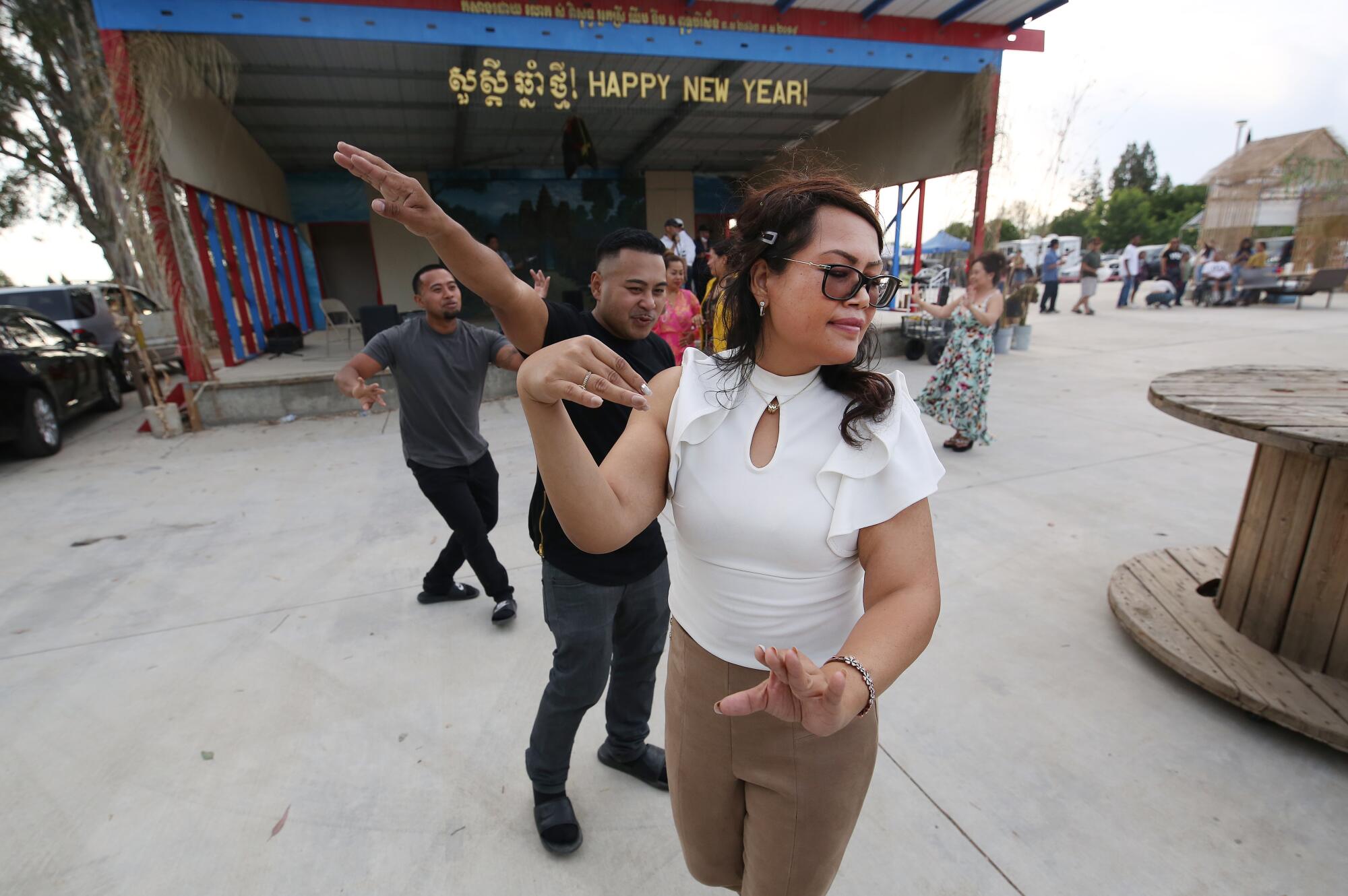
Yet, somehow, some lived and escaped, and on a summer night in Fresno they were moving to music that a regime had tried to silence forever. Some held grandchildren.
Kim was 1 month old when his family was moved to a Khmer Rouge death camp. They survived a harrowing, long-shot dash and then a desperate journey to Thailand.
He grew up in a rodent-infested refugee camp until his family immigrated to the United States when he was 11.
His memories of the first few days at his relatives’ home in Texas are like a dream — oversaturated with color: clean and shiny people, his first bite of a crisp apple and an icy sip of Budweiser beer (no one in his family knew Americans had drinks only for grown-ups). He literally thought he had gone to heaven during his first ride in a car.
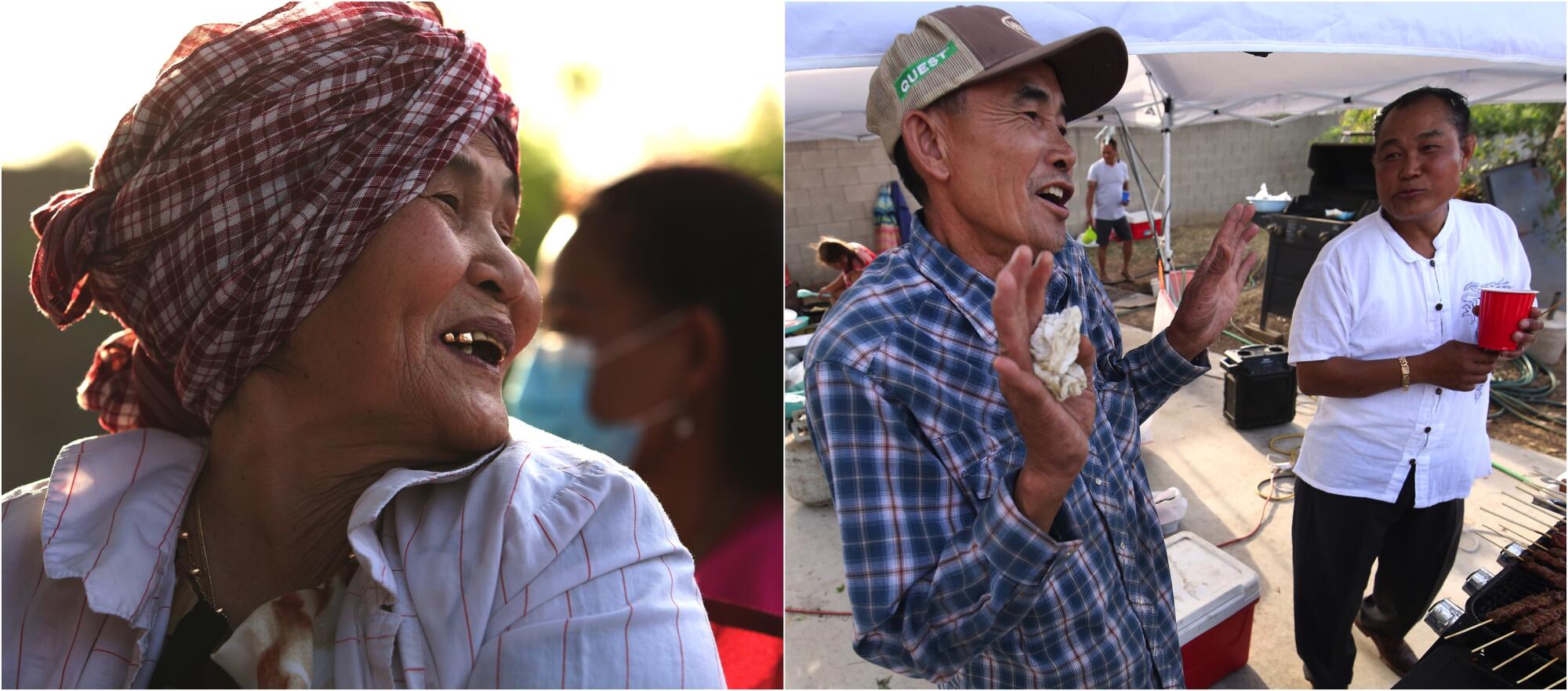
Then the recollections darken. His family lived in a tiny roach-infested apartment in Long Beach. His parents and their Cambodian neighbors all locked themselves inside, leaving only to get their government checks and groceries. He knew no English and didn’t understand why the teacher wouldn’t speak to him.
He remembers the shock of the first time he was attacked, as if it happened yesterday: curling up in a fetal ball, tasting his own blood.
“Before you can save the world, you have to save yourself.”
— Danny Kim, Cambodian night market founder
The boy who jumped him screamed “Go home!” as he kept kicking. After that, the jumpings blur — there were too many of them.
As a boy, he first wanted to be a police officer because he wanted to arrest the teens who beat him. But he also never believed he would graduate high school.
The day he took the exam for the police academy there were 200 candidates. He saw no one else who looked Asian.
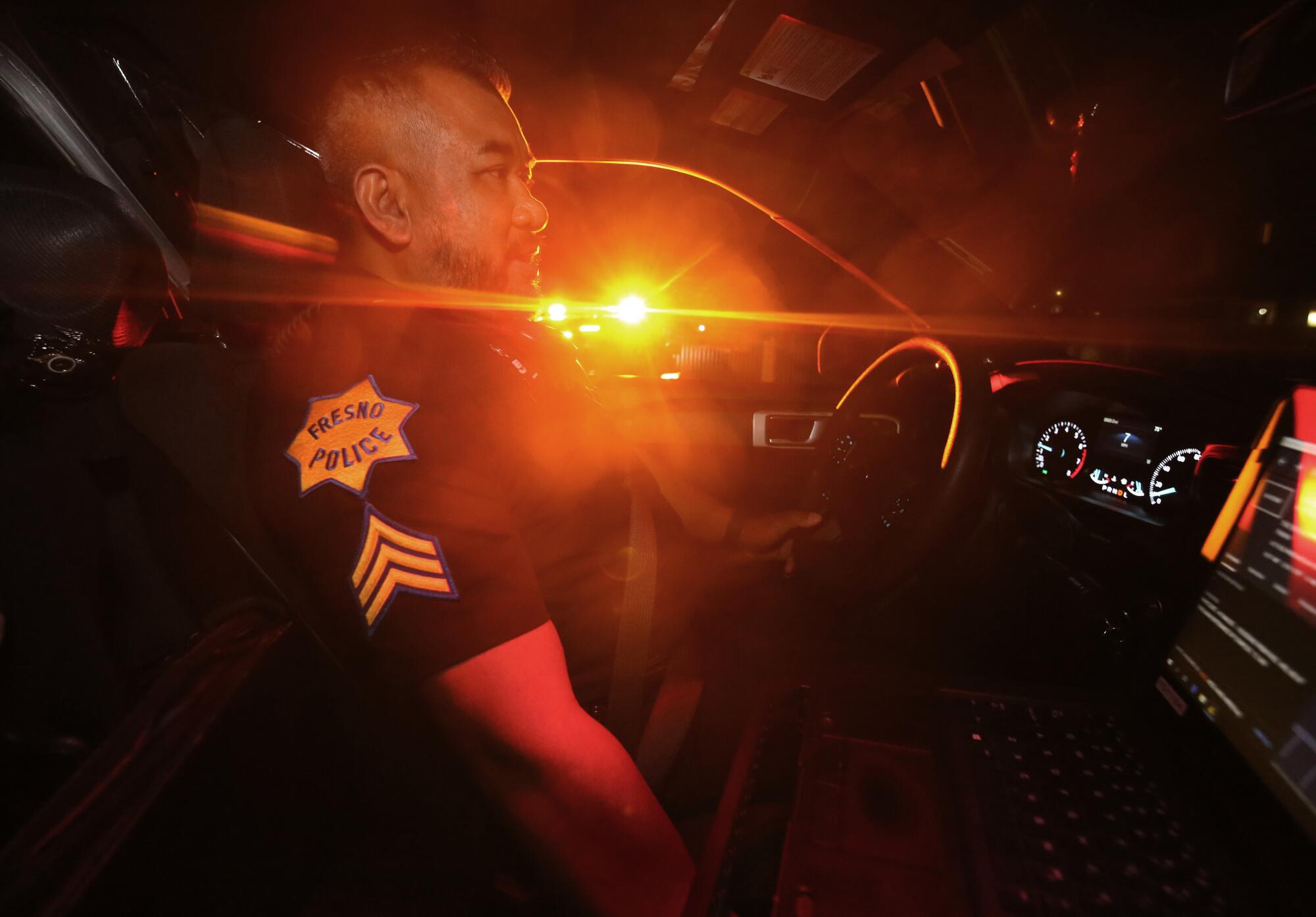
“This will never happen,” he thought. He was ranked 11th and accepted.
By then, he knew what he was after. He wanted to be a liaison for his community.
He wanted to bring Buddhist principles to policing, showing empathy and respect.
He wanted a profession and enough money that his family always lived in a safe neighborhood.
“You have to save yourself,” he said. “Before you can save the world, you have to save yourself.”
One thing he never wanted was to return to Cambodia. But he was unable to say no to his father, Savunn Im.
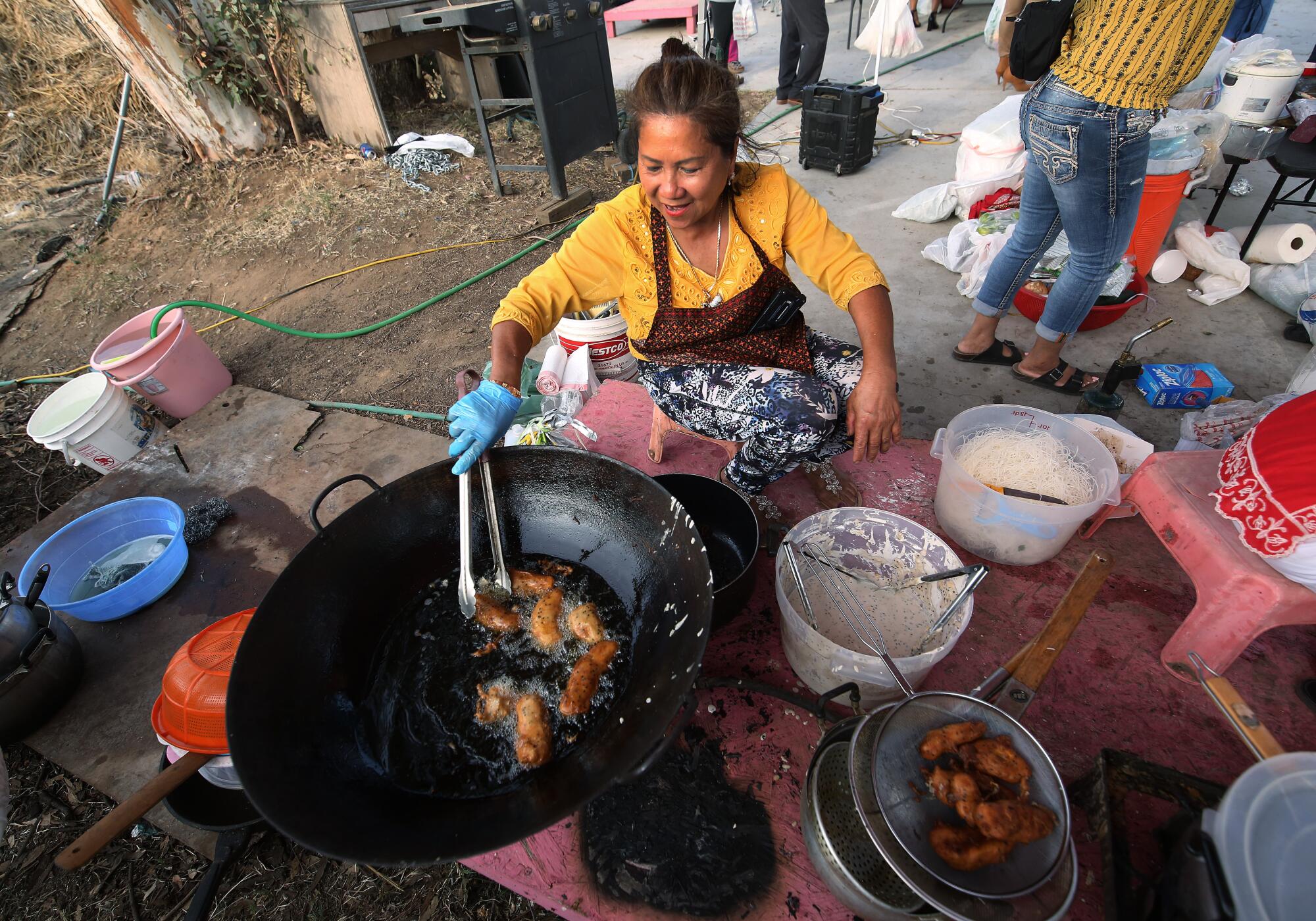
Kim’s father returned to his homeland every year, but in 2014 he told his son he was too frail to travel alone and needed his help.
They went to the village where Kim was born, and the place where his uncle was executed. Im had been a monk near this village before he met Kim’s mother, Soeun Ven, and gave up his monastic life.
Lowell, Mass., was known for embracing immigrants. But it never shared power with newcomers until Cambodian refugees found a way to remake the city.
Father and son visited the night market at Siem Reap, the tourist gateway to Angkor Wat, a temple complex that dates back to the 12th century. Music pumped, a vast array of street food beckoned, the place was filled with people from all over the world and there was laughter.
That was Kim’s moment of conviction.
“When you think of Cambodia, what do you think of? Genocide,” he said, answering his own question. “But here was Cambodian life and community being shared.”
Kim swore on the spot that he would bring the night market to Fresno.
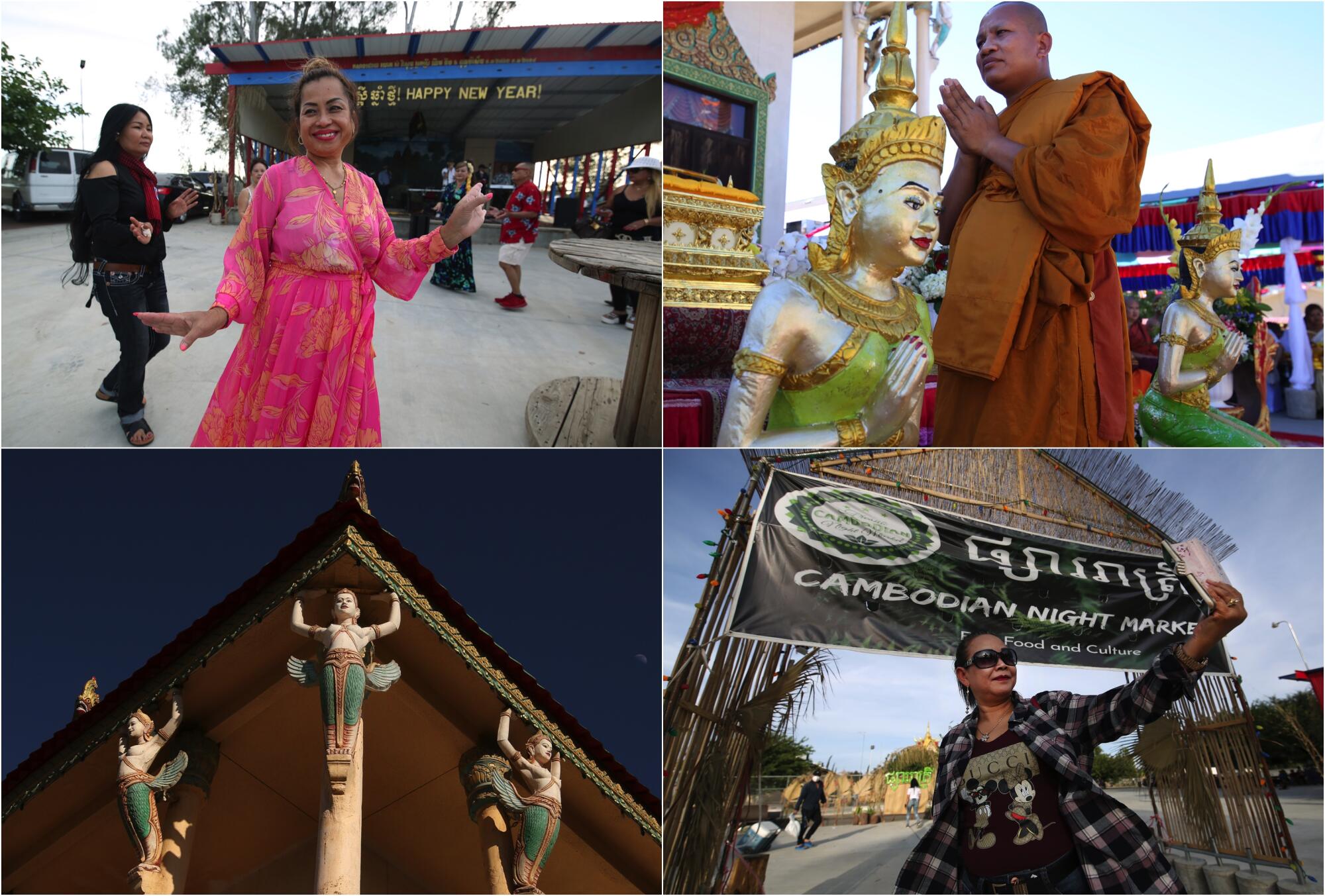
He approached the temple leaders. They said no. They were afraid of liabilities and strangers.
But leaders change.
Kim tried again and the next time found support.
On a Friday night, a man fed 10-foot sugarcane stalks into a grinder for fresh juices. Meats sizzled on grills loud enough to hear over the music. Other vendors sold papaya salads and pahut sticks — fried fish stuffed with lemongrass and other herbs. Scents of smoke and spices drifted on the valley breeze.
At Sweet Girl Farms, Liset Garcia seeks to be as resilient as her sunflowers, as she tends a bustling fruit stand amid a dire dry period.
Kim joked with vendors and bowed to monks. He was wearing shorts and flip-flops, but several gang members gave him a friendly “Hello, Sgt. Kim.”
He said they would not cause trouble because their parents are vendors and it would cost their families money if the market was closed down.
“People feel safe here,” he said.
He hoped the event, which is the first Friday of the month, will eventually become weekly and will grow to draw a diverse crowd.
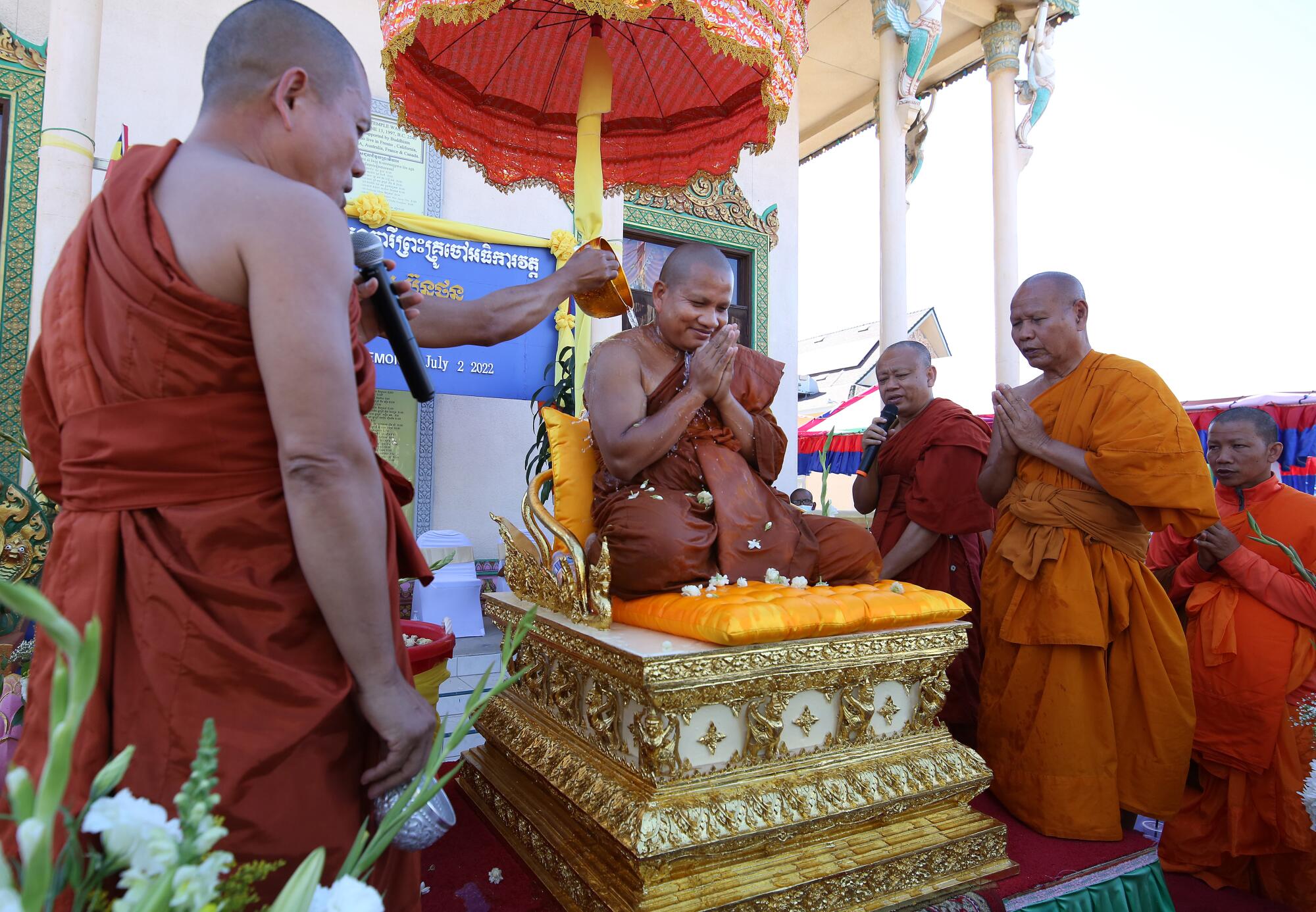
“When people know each other, they’re less afraid and there is less violence,” he said. “See? I’m thinking like a police officer.”
Soreath Hok, 37, arrived, immediately running into the brother of her uncle by marriage. She said it’s become a place you can show up knowing you’ll see family and friends.
Hok’s parents brought her to the U.S. when she was 2. She thought she had escaped the shadow of the genocide — she was a music-loving former college DJ and a successful college-educated entrepreneur in San Francisco. But on a visit home, she was shocked by how much her parents had aged.
She upended her life and moved back to help them with their doughnut shop during the pandemic.
Hok became a radio reporter at a local station and is working on a project about trauma in the Cambodian community because of the genocide.
“A lot of people here aren’t OK. There’s a lot of pain,” Kim told her. “They say there’s always light at the end of the tunnel. But that only works if you don’t get stuck in the middle of the tunnel. You have to give people something to pull them forward.”
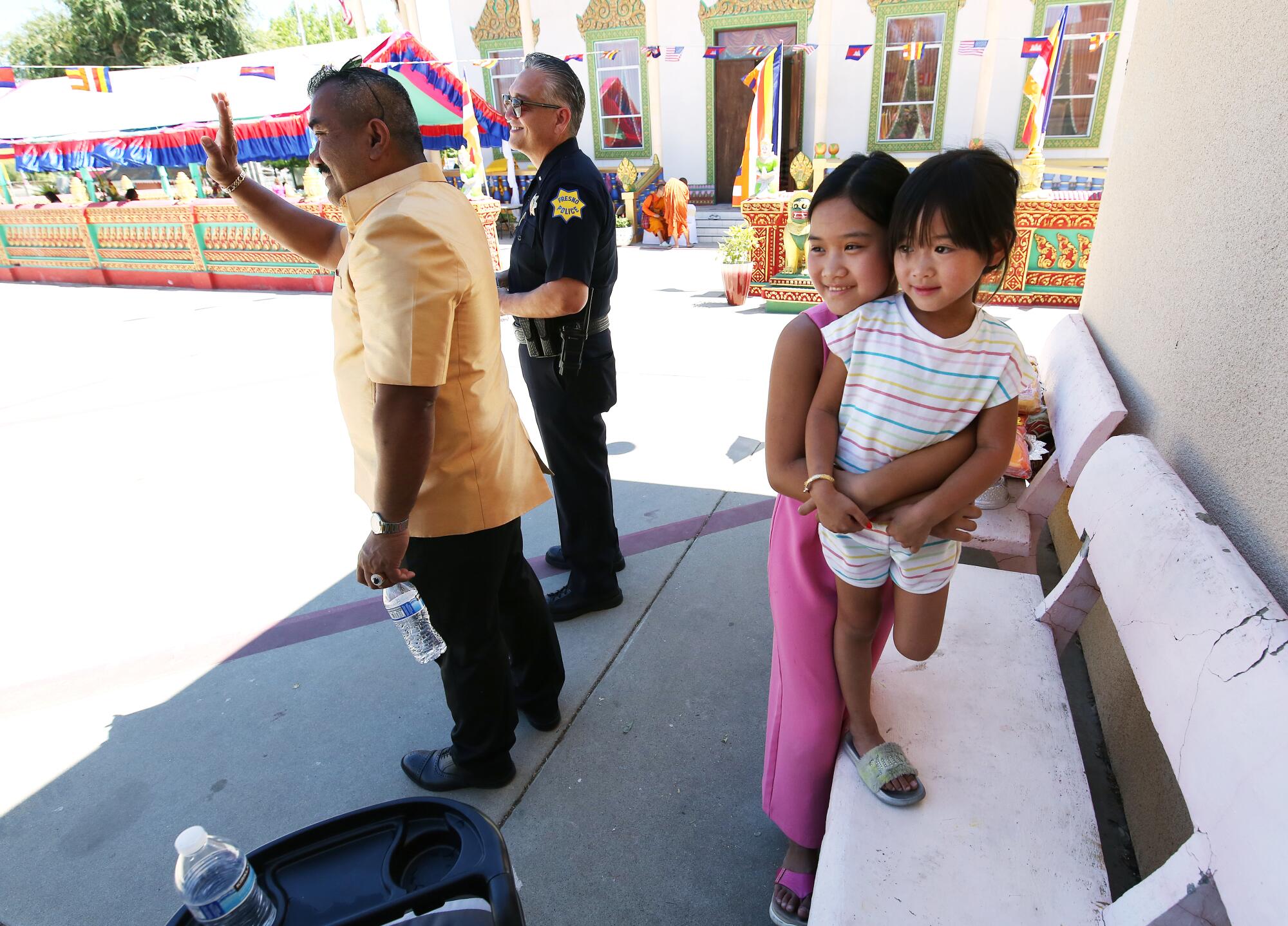
Soma Norodom approached and introduced herself.
Hok startled at the name.
Norodom is a Cambodian princess, raised in Long Beach. Her father, a member of the Cambodian royal family and a pilot who helped Americans in the Vietnam War, was one of the first Cambodian refugees in 1975.
He came to Fresno in 1987 to form an aid organization helping a second wave of refugees find housing, jobs and support.
Norodom said it was her father’s dying wish that she return to Cambodia and claim a role as princess. She tried but was forced out. She said she feels she is where she should be.
“His true legacy is right here,” she said.
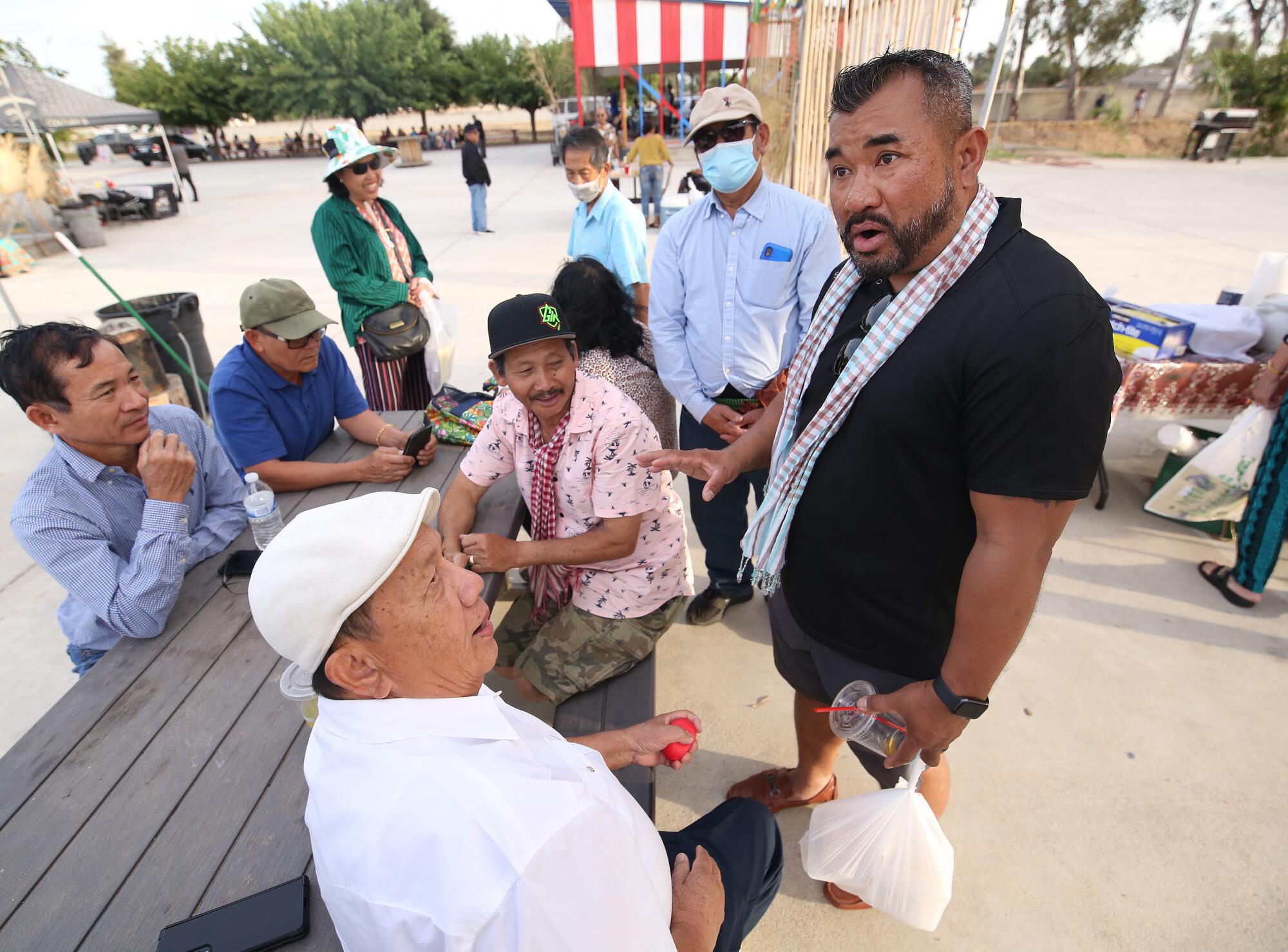
“The old ones were dying and there were no new leaders until Danny. He’s keeping our culture going in this country and I want to help.”
As the sun set, striping the sky orange, the temple’s newly appointed abbot — dressed in orange robes and carrying an orange iPhone case — said he hoped Cambodian nights would bring more people to the temple to sit in the shade of the Bodhi tree, look at the beauty of the lotus flowers, and perhaps take one of the incense sticks that are always waiting and offer a prayer for peace.
Young cousins took turns on a hoverboard. Women in bright dresses took a walk in a rice paddy planted near the temple.
On the dance floor, a giggling group practiced the steps of that global party standby, the electric slide.
After her husband died, Sherril Wells needed a reason to carry on. She found it in tilling the Fresno fields he planted, giving away fresh food to the hungry.
In some ways it was a humble event — fewer than a dozen vendors with few people outside the Cambodian community attending.
Kim had to leave early to get ready for his regular night shift.
He would trade his Angkor Wat tourist T-shirt for a crisp blue uniform. He would run a briefing for a half- dozen officers who looked so young that if they were actors they could have played high school kids.
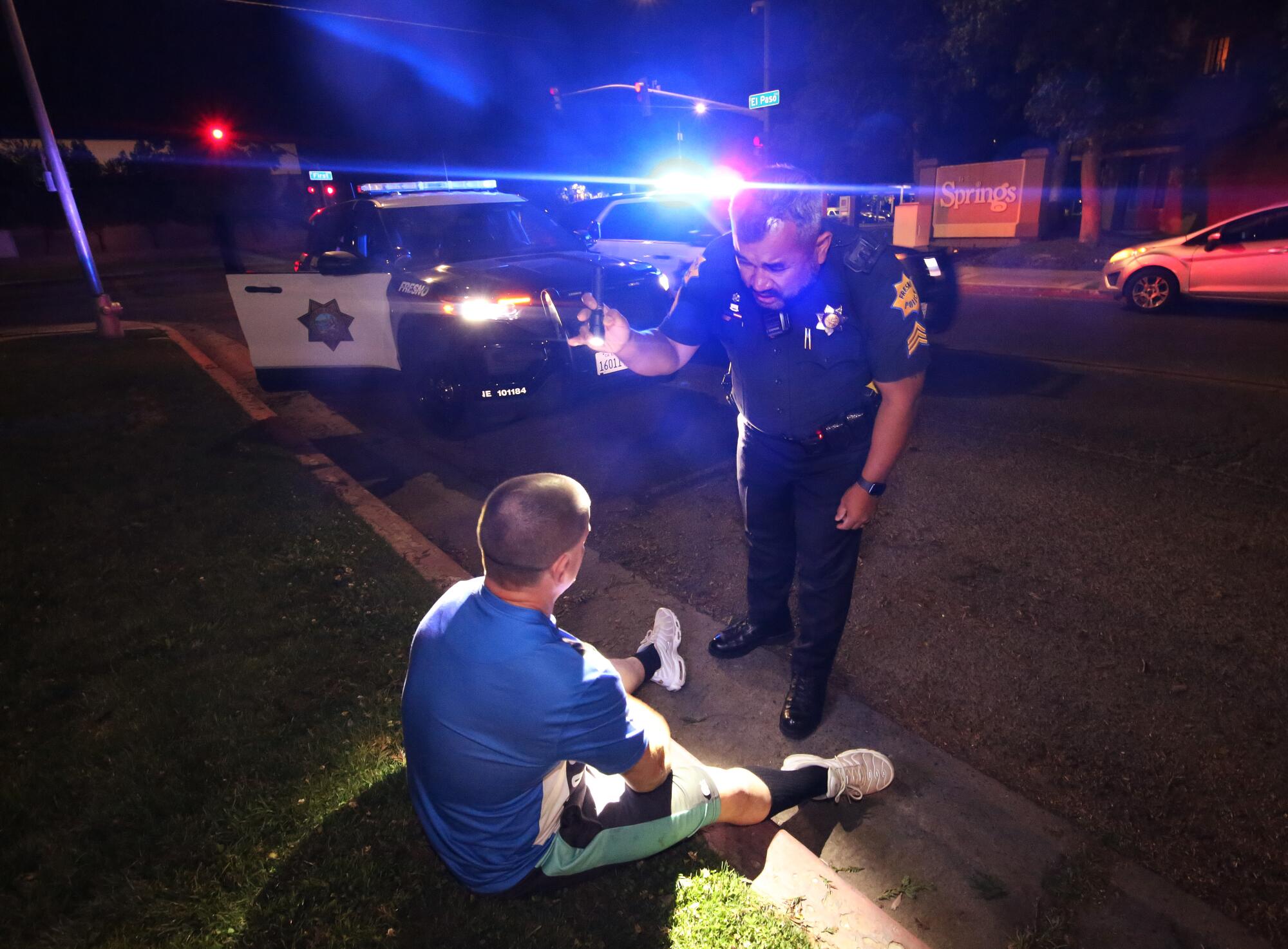
“Remember to use your mental judo out there,” he would tell them. “Words and compassion. Let’s keep everyone safe.”
It would be a long, turbulent night and he would once again wish for a day schedule.
But as he left, he took a moment to stand and watch the night market.
Khmer music played, people danced and life continued.
“You understand the magnitude of that?” he asked. “Just that we’re here together.”
More to Read
Sign up for Essential California
The most important California stories and recommendations in your inbox every morning.
You may occasionally receive promotional content from the Los Angeles Times.
